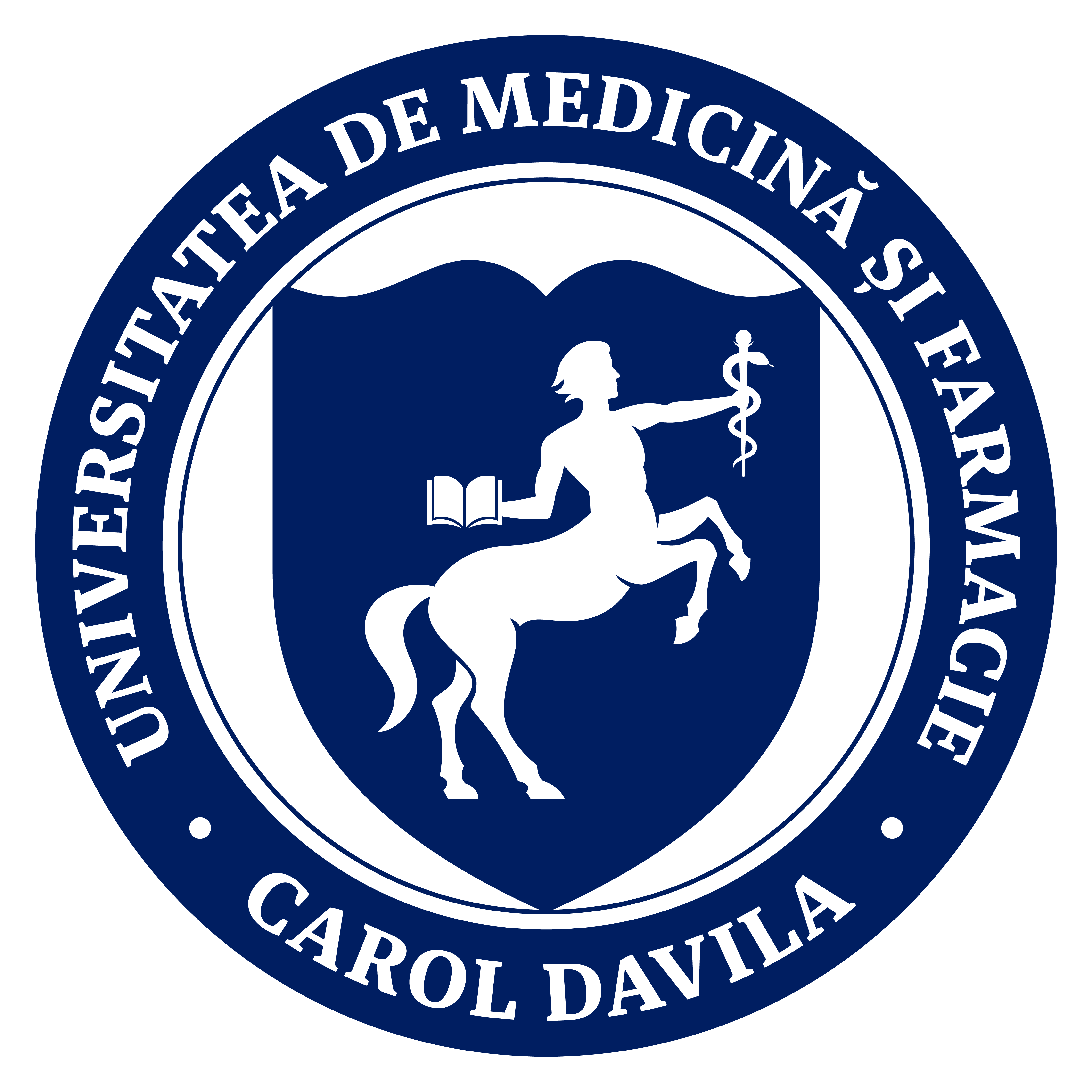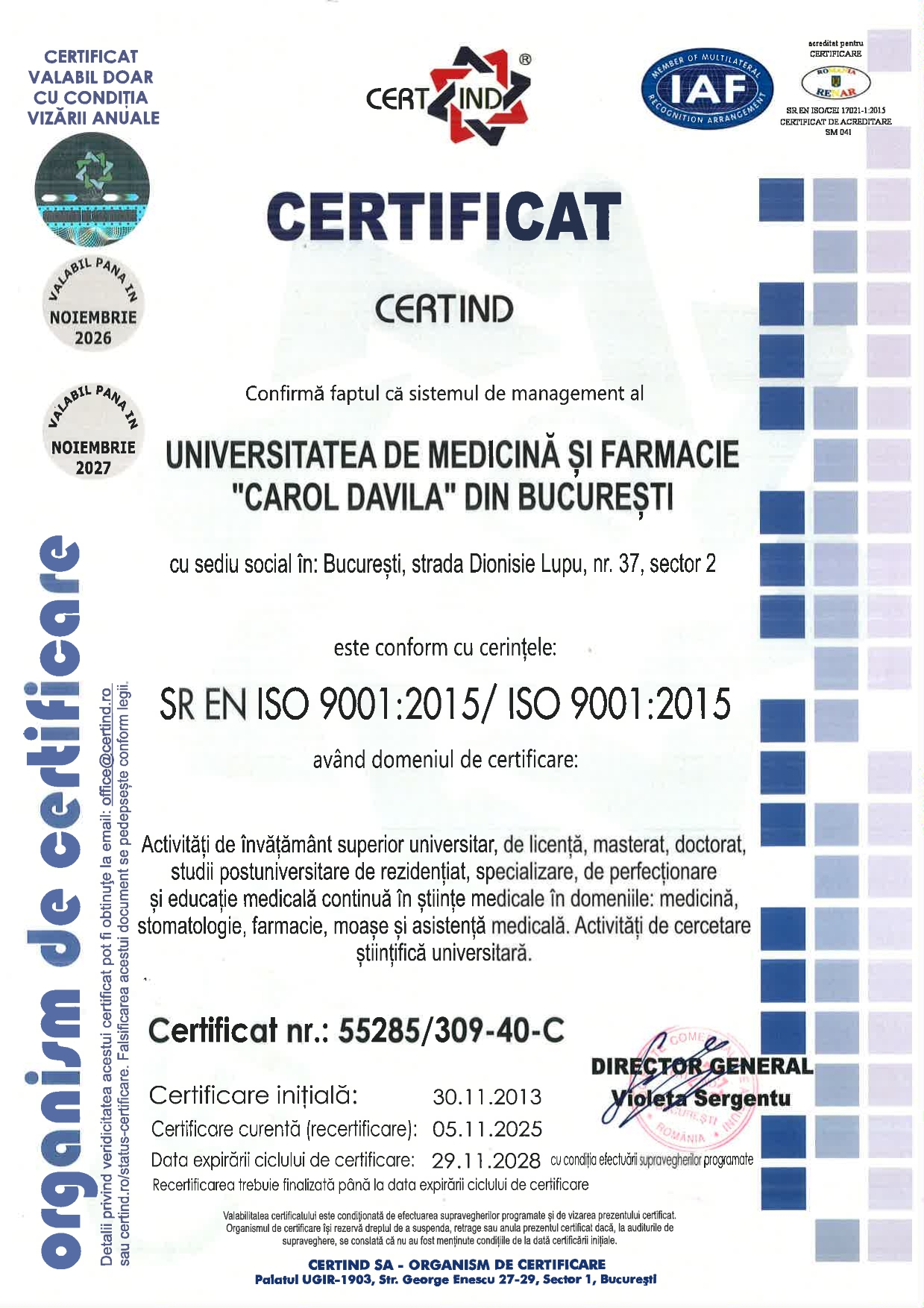Discipline - Balneofiziokinetotherapy and Recovery
- List of academic staff
- Brief history of discipline
- Description of education and research activities
- Useful informations for students
- Useful informations regarding postgraduate courses
- 5 to 10 keywords that describe subfields of interest for the research activity
- 5 most representative research projects
- 10 most significant scientific papers
| Associate Professor | Mirea Andrada, PhD | tenured |
| Head of works | Dimulescu Dana Maria, PhD | tenured |
| Head of works | Chiriti Gheorghe, PhD | tenured |
| Head of works | Sporea Corina, PhD | tenured |
| Assistant Professor | Dragan Constantin Florin, PhD | tenured |
| Assistant Professor | Nicolae Georgiana, PhD | tenured |
| Assistant Professor | Chiriac Ovidiu Cristian, PhD | tenured |
Medical activity within the discipline is similar to the activity of any hospital with a medical rehabilitation profile, physical therapy (therapy through movement) being the chief agent of medical recovery.
The Center however differs from many others in the large number of physiotherapists and physiotherapy rooms, existing equipment, exceptional organization, robotic therapies unique in the country and the increased number of children who come here for diagnosis and therapy.
The patient is consulted by the doctor, wich establishes the diagnosis and outlines the broad lines of the recovery process. If no further analysis is required and there are no major contraindications patient is assigned to the 2 physiotherapists dealing with the case. They continue the evaluation process and implement rehabilitation treatment, noting the results of the observation sheet.
Depending on the pathology the patient may benefit from neurological or orthopedic consult / surgical specialty procedures physiotherapy, occupational therapy, speech therapy, robotic training, psychological counseling, guidance orthotic / prosthetic etc.
The center treats a wide range of pathologies of the most diverse: static plantar disorders, congenital hip dislocation, scoliosis, myelomeningocele, tetra / paraparesis traumatic or secondary cerebral palsy, stroke, traumatic brain injury, paralysis of brachial plexus, syndromes extrapyramidal, rare genetic diseases, the Centre is fully capable of meeting the needs of these patients.
Most of the specialized courses within the discipline are carried out in the National Clinical Centre of Neuro- Psycho-motor Rehabilitation for Children "Dr. Nicholas Robanescu" a modern centre by European standards, which lies in the number of physiotherapists and existing equipment before many centers in Europe, so
The center has a total of 28 rooms with 3 beds, intensive care wards, eight modernly equipped physical therapy rooms, served by more than 20 physiotherapists, two occupational therapy rooms, Cabinet of Neurology EMG and EEG equipment has vigilance and monitoring long-sleeping and waking, sensory stimulation room
Quantified gait analysis laboratory fully operational, served by physician experienced in France and two graduates from the Faculty of Pharmacy Balneofiziokinetoterapie.
The laboratory allows a precise analysis of gait patient on the basis of records with the help of special equipment (markers bright-reflective electrodes, EMG surface) and a modern computerized consisting of rooms optoelectronic (issuing and capture infrared light) platform EMG signal strength and receiver.
- 2 devices for plantar evaluation support, device for evaluating disorders of vertebral statics
- 4 modern devices for training and walking reeducation: Lockmant and G-EO, pool with underwater tape drive, walking tape with optical cameras with the possibility of gait correction in real time, computerized device for balance training
- 2 computerized devices for training and coordination of upper limb Armotion and Armeo
- 2 cabinets for physiotherapy equipped with moden devices (BTL combine all forms of currents, ultrasound and laser, laser MLS, high power laser, short wave, magnetodiaflux, TECAR therapy, Bioptron, Shockwave etc.)
- Modern equipment for bone densitometry, radiology and ultrasound
Laboratory orthotics / prosthetics
All this material basis, computer equipment endowement is used extensively in the service of children with neuro-psycho- motor without discrimination, regardless of nationality, place of origin, religious, educational and social status.
This futuristic landscape for the romanian medical context integrates the students that study Balneofiziokinetotherapy UMFCD. They perform their teaching and research (with a view to preparing the diploma) with physiotherapists with experience under the supervision of teachers, having casuistry -patologii access to a rich and diverse modern means of recovery. Some of them participate in vacancy competitions and become employees of the Centre as it has happened several times in recent years.
The Centre conducted several clinical trials, several employees of the Centre are PhDs. The Existing equipment is commonly used in the work of PhD:
- Shock wave therapy in the management of spasticity
- botulinum toxin in the management of spasticity in children (we are the most experienced center in the country on the use of botulinum toxin in children)
- immobilization osteoporosis (DEXA)
- plantar support and scoliosis
- gait analysis
- Armeo device in recovery sensomotory deficits of the upper limb etc.
Within the Center there are conducted courses and practical works such as:
- Pediatric Rehabilitation
- Rehabilitation in neurology
- Kinetoprophylaxy in pregnancy and confinement after birth
- Evaluation in Physical Therapy
- Methods and techniques of physiotherapy
- Electrotherapy
- Orthotic-Prosthetic
- Occupational Therapy
- Massage Techniques etc.
2 posdgraduate courses:
- „Certificate for botulinum toxin injection" and
- „Treatment of operated / unoperated scoliosis on child"
primarily address to medical specialists or MDs of the following specialties: medical rehabilitation, orthopedics band neurology
- Robotic therapies
- Neurorehabilitation
- Walk analysis
- Plantar support
- Cerebral palsy
- Extrapyramidal syndromes
- Scoliosis
- Orthotics
- Botulinum toxin
- 2006-2011 The individualized management of the mobility rehabilitation at patients with neurological and ortopedical pathology – acronym MANMOBRE
- 2014 - Detection of paroxysmal sleep disorders in children with neuropshychomotric deficiency by renovating, rehabilitating and equipping the EEG room
- „Cercetǎri privind utilizarea terapiei cu unde extracorporeale de șoc ȋn combaterea spasticitǎții la copiii cu paralizie cerebralǎ” Mirea Andrada (teză de doctorat/carte) 2015
- “Toxina botulinică in tratamentul spasticității la copil” Pădure Liliana (teză de doctorat /carte) 2003
- “Compendiu de neuroreabilitare la adulţi, copii si varstnici”: G.Onose, L.Padure, I.Angelescu, C. Chendreanu,Editura universitara “Carol Davila”2009 (ISBN 978-973- 708-294- 7)
- ”Dispozitiv ortetic mecatronic. Concept, premise si aspecte functional constructive” – Gelu Onose, Vladimir Cârdei, Ștefan Tudorel Crăciunoiu, Valeriu Avramescu, Andrada Mirea, printed at ICTCM SA – ISBN 978-973- 0-12764- 5, 2011
- “Achievement of an experimental mechatronic orthotic device to assist/rehabilitate orthostatism and walk in patients with complete paraplegia and other specific severe disabled conditions” G. Onose, V. Cardei, A.V. Ciurea, J. Ciurea, L. Onose, A. Anghelescu, T. St. Craciunoiu, V. Avramescu, E. Visileanu, G. Epureanu, C. Chendreanu, I. Andone, A.Spinu, M.Haras, A.Mirea, communication at “the 7th Mediterranean Congress of Physical and Rehabilitation Medicine, Portorose, Slovenia” and published in Proceedings, Edizioni Minerva Medica, Torino, 2008 (ISBN-10: 88-7711- 616-1; ISBN-13: 978-88- 7711-616- 1)
- “Initiation of a National Informatics Network for Patients with Sequels after Spinal Cord Injury (SCI)” G. Onose, A. Anghelescu, F. Georgescu, A.S. Mihaescu, C. Mardare, C. Chendreanu, A.V. Ciurea, F. Exergian, G. Epureanu , A. Ionescu, C. Baluta, L. Paun , V. Avramescu, R. Grejdenescu , L. Onose , R. Ioanid , P. Armean, C. Mihaescu, C. Nicolau, M. Haras, A. Mirea, C. Popescu, comunication at “the 7th Mediterranean Congress of Physical and Rehabilitation Medicine, Portorose, Slovenia” and published in Proceedings, Edizioni Minerva Medica, Torino, 2008 (ISBN-10: 88-7711- 616-1; ISBN-13: 978-88- 7711-616- 1)



